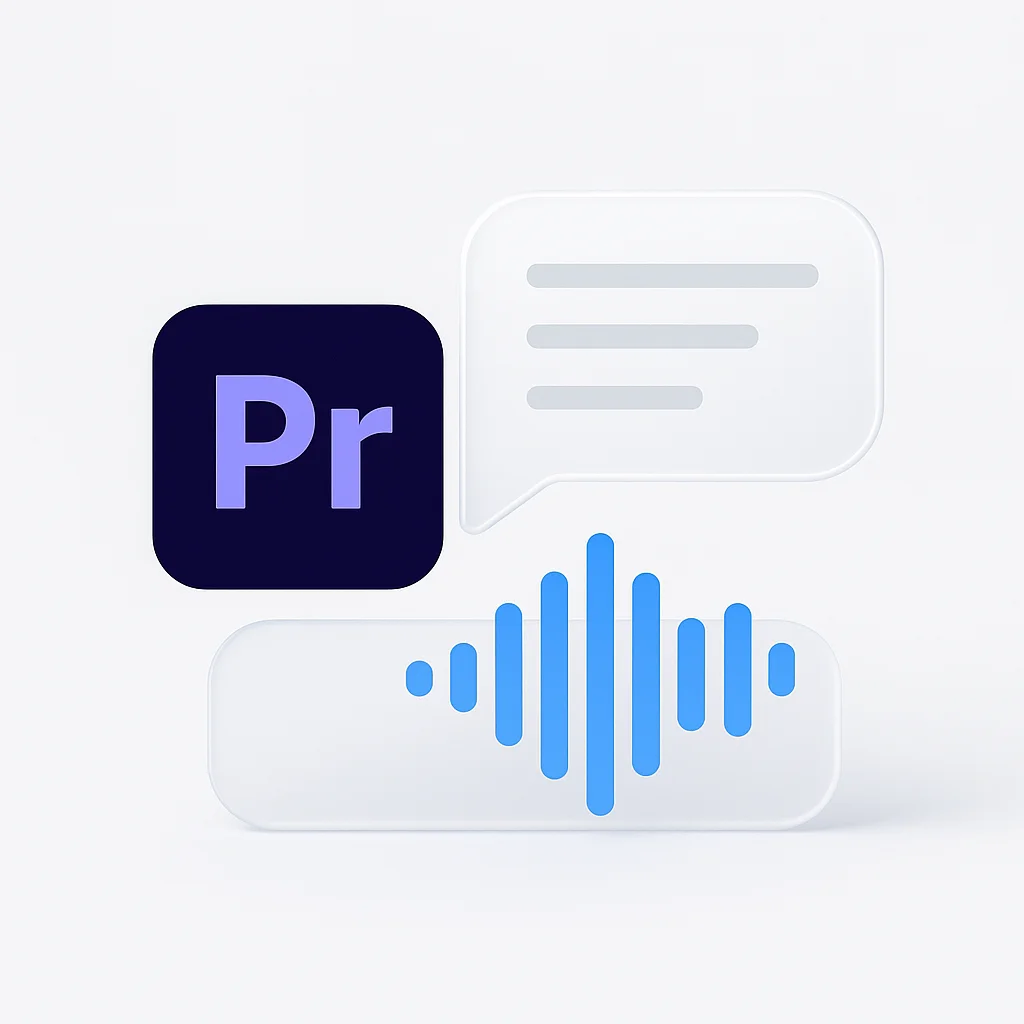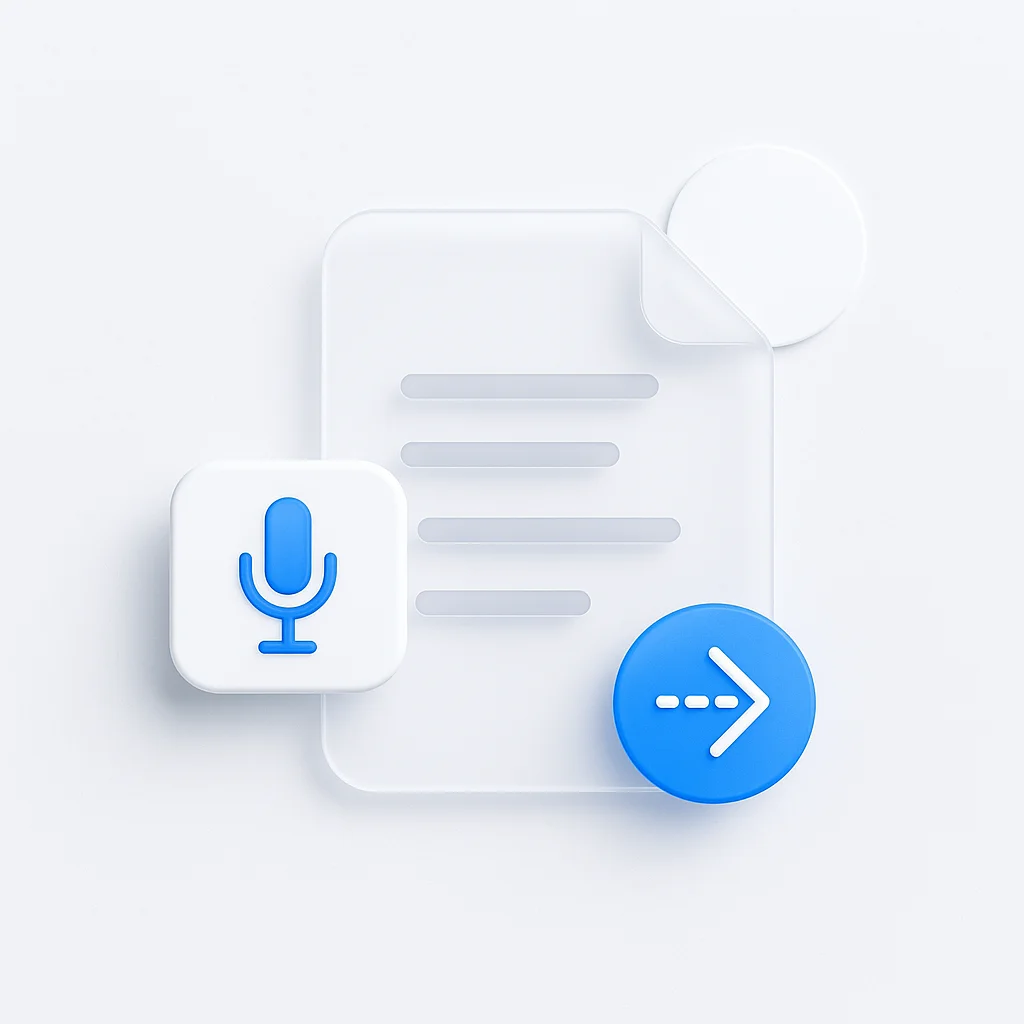Finding the right podcast hosting platform can make or break your podcasting success. With over 464 million podcast listeners worldwide in 2025, choosing the perfect hosting solution is crucial for reaching your audience effectively. This comprehensive guide reviews the top 10 podcast hosting platforms, comparing their features, pricing, and performance to help you make an informed decision.
Top Podcast Hosting Platforms at a Glance
| Platform | Best For | Key Features | Starting Price | Rating |
|---|---|---|---|---|
|
Spotify Owned
|
Beginners |
Free hosting
Built-in editing
Content Repurposing:
|
FREE |
★★★★☆
4.0/5
|
|
Buzzsprout
BEST OVERALL
Most Popular
|
Ease of use |
Auto optimization
Detailed analytics
|
$12/month |
★★★★★
5.0/5
|
|
Established 2004
|
Veteran podcasters |
Advanced stats
Monetization
|
$15/month |
★★★★☆
4.0/5
|
|
Monetization Focus
|
Monetization |
Built-in ads
Live streaming
|
$9/month |
★★★★☆
4.0/5
|
|
WordPress Expert
|
WordPress users |
WP integration
Private podcasting
|
$19/month |
★★★★☆
4.0/5
|
|
AI-Powered
|
Advanced features |
AI Transcription:
Dynamic Ad Insertion:
Content AI:
Advanced Analytics:
API Integration:
Professional Tools:
|
$18/month |
★★★★☆
4.0/5
|
|
Live Focus
|
Live broadcasting |
Live streaming
Real-time chat
|
$7/month |
★★★☆☆
3.0/5
|
|
Analytics Pro
|
Analytics focus |
Advanced analytics
Listener insights
|
$15/month |
★★★★☆
4.0/5
|
|
Ad Marketplace
|
Advertising |
Programmatic ads
Global reach
|
Contact |
★★★★☆
4.0/5
|
|
Enterprise Platform
|
Enterprise |
Dynamic ads
Advanced analytics
|
Contact |
★★★★☆
4.0/5
|
|
Revenue Sharing
|
Revenue sharing |
No hosting fees
Ad revenue share
|
FREE |
★★★☆☆
3.0/5
|
What is a Podcast Hosting Platform?
A podcast hosting platform is a specialized service that stores your podcast audio files and distributes them to various podcast directories and apps like Apple Podcasts, Spotify, Google Podcasts, and others. Unlike regular web hosting, podcast hosts are optimized for audio content delivery and provide RSS feeds that podcast apps use to automatically download new episodes. Many platforms also offer professional transcription services to help make your content more accessible and searchable.
Key features of modern podcast hosting platforms include:
- Audio Storage: Unlimited or high-capacity storage for your podcast episodes
- RSS Feed Generation: Automatic creation and management of podcast RSS feeds
- Distribution: One-click submission to major podcast directories
- Analytics: Detailed listener statistics and engagement metrics
- Monetization: Tools for advertising, sponsorships, and premium content
- Website Integration: Built-in websites or WordPress integration
- Recording Capabilities: Some platforms include screen recording tools for creating video podcasts
This comprehensive guide explores the 12 best podcast hosting platforms in 2025, analyzing their features, pricing, and unique advantages to help you make an informed decision.
Benefits of Professional Podcast Hosting
Professional podcast hosting platforms offer numerous advantages over free alternatives or self-hosting solutions:
Reliability and Performance: Dedicated podcast hosts ensure 99.9% uptime and fast global content delivery, preventing broken episodes or slow downloads that can frustrate listeners.
Automatic Distribution: Submit your podcast to all major directories with one click, saving hours of manual submission work and ensuring your content reaches the widest possible audience.
Advanced Analytics: Track downloads, listener demographics, engagement rates, and popular episodes to optimize your content strategy and attract potential sponsors. Consider using advanced video editing tools to enhance your podcast’s visual appeal and create promotional content for social media.
How Podcast Hosting Works
Podcast hosting follows a simple yet powerful workflow:
- Upload Your Episode: Record and upload your audio file to your hosting platform
- Automatic Processing: The host optimizes your audio, generates metadata, and creates RSS entries
- Distribution: Your episode automatically appears on all connected podcast directories
- Analytics Collection: The platform tracks downloads, plays, and listener behavior
- Monetization: Built-in tools help you earn revenue through ads, sponsorships, or premium content
- Content Enhancement: Use AI-powered transcription tools to create searchable text versions of your episodes
To help you with your podcasting workflow, we offer a few tools that can help. Our podcast recorder can help you record your podcasts with high-quality audio. We also have an AI podcast translator to help you reach a wider audience, and an AI podcast summarizer to help you create summaries of your podcasts for social media.
This streamlined process allows podcasters to focus on content creation while the technical distribution happens automatically in the background.
Who Needs Professional Podcast Hosting
New Podcasters: Beginners benefit from user-friendly interfaces, automatic optimization, and built-in guidance that simplifies the technical aspects of podcasting.
Established Creators: Experienced podcasters need advanced analytics, monetization tools, and reliable infrastructure to support growing audiences and revenue streams.
Business Podcasters: Companies require professional features like team collaboration, branded players, private episodes, and detailed ROI tracking for corporate podcasting initiatives.
Content Creators: YouTubers, bloggers, and influencers expanding into podcasting need seamless integration with existing platforms and cross-promotion tools. Many creators also benefit from Google Meet recording and editing features for remote podcast interviews and collaborations.
The 12 Best Podcast Hosting Platforms in 2025
1. Spotify for Podcasters - Best Free Platform for Beginners

Overview
Formerly Anchor, Spotify for Podcasters is now the unified platform offering completely free hosting with built-in creation tools. Owned by Spotify, it provides an all-in-one solution perfect for beginners who want to start podcasting without upfront costs while leveraging Spotify’s massive user base.
Key Features
- Free Unlimited Hosting: No storage limits or bandwidth restrictions
- Built-in Recording Tools: Record directly in your browser or mobile app
- Direct Spotify Publishing: Bypass traditional RSS distribution for faster Spotify updates
- Video Podcasting: Support for video episodes on Spotify
- Sponsorship Matching: Automatic ad insertion and sponsor connections
- Voice Messages: Allow listeners to send voice messages for audience engagement
- Content Repurposing: Easily create social media content from your podcast episodes
Pros:
- Completely free with no hidden costs
- Extremely beginner-friendly interface
- Direct integration with Spotify’s ecosystem
- Priority placement in Spotify algorithms
- Built-in monetization opportunities
- Growing video podcast support
- Access to Spotify’s massive user base
Cons:
- Limited customization options
- Basic analytics compared to paid platforms
- Less control over RSS feed and distribution
- Heavy focus on Spotify may limit other platform growth
- Newer platform with fewer proven features
- Limited third-party integrations
Pricing
Spotify for Podcasters is completely free with optional paid advertising and promotion features, making it ideal for new podcasters testing the waters.
2. Buzzsprout - Best Overall User Experience
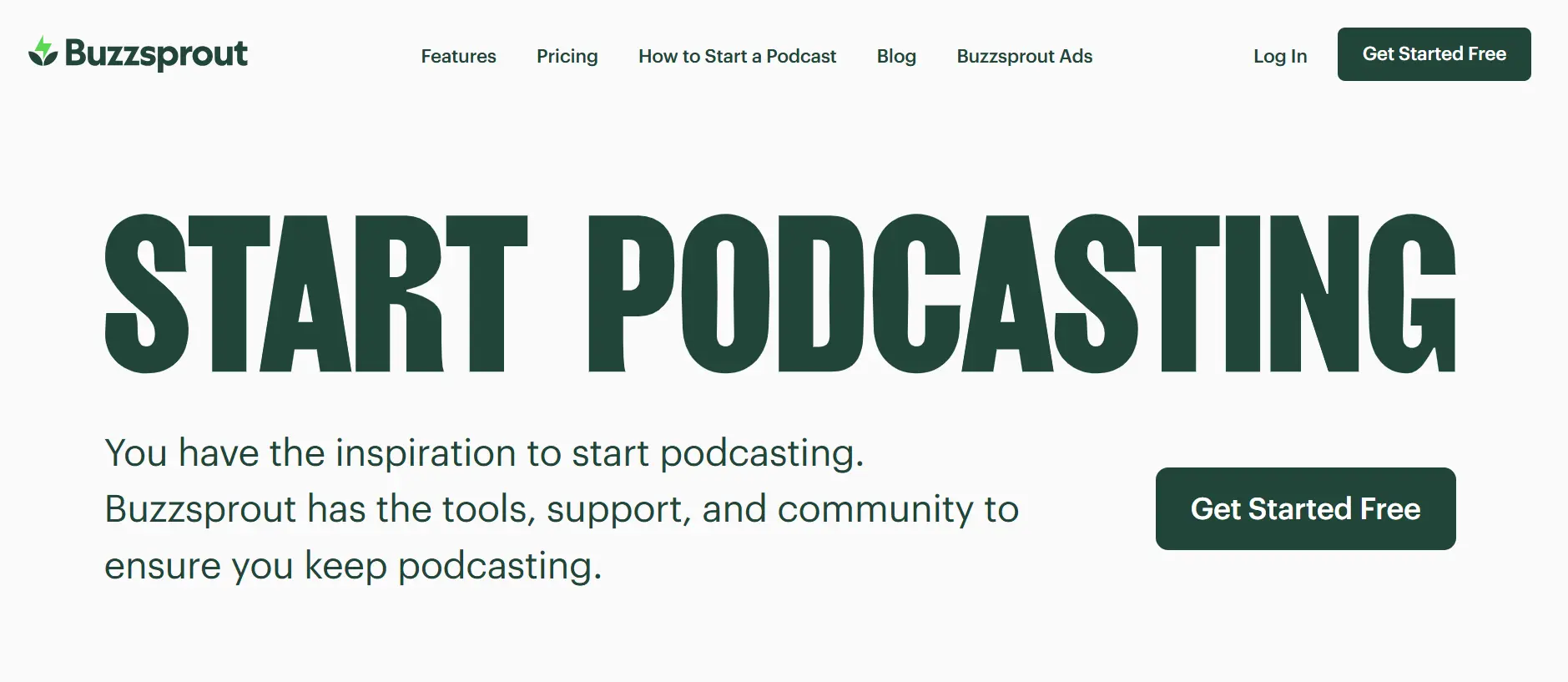
Overview
Buzzsprout combines ease of use with powerful features, making it the top choice for podcasters who want professional results without technical complexity. Their automatic audio optimization and detailed analytics provide excellent value.
Key Features
- Magic Mastering: Automatic audio enhancement and level optimization
- Detailed Analytics: Comprehensive listener insights and geographic data
- Website Builder: Free podcast website with customizable themes
- CoHost by Buzzsprout: Advanced podcast analytics and audience insights
- Affiliate Program: Earn revenue by referring new podcasters
Pros:
- Intuitive interface loved by beginners and experts
- Excellent customer support and educational resources
- Automatic audio optimization saves editing time
- Transparent pricing with no hidden fees
Cons:
- Higher pricing compared to some competitors
- Limited storage on lower-tier plans
- No live streaming capabilities
Pricing
Plans start at $12/month for 3 hours of uploads, with higher tiers offering more storage and advanced features.
3. Libsyn - Best for Veteran Podcasters
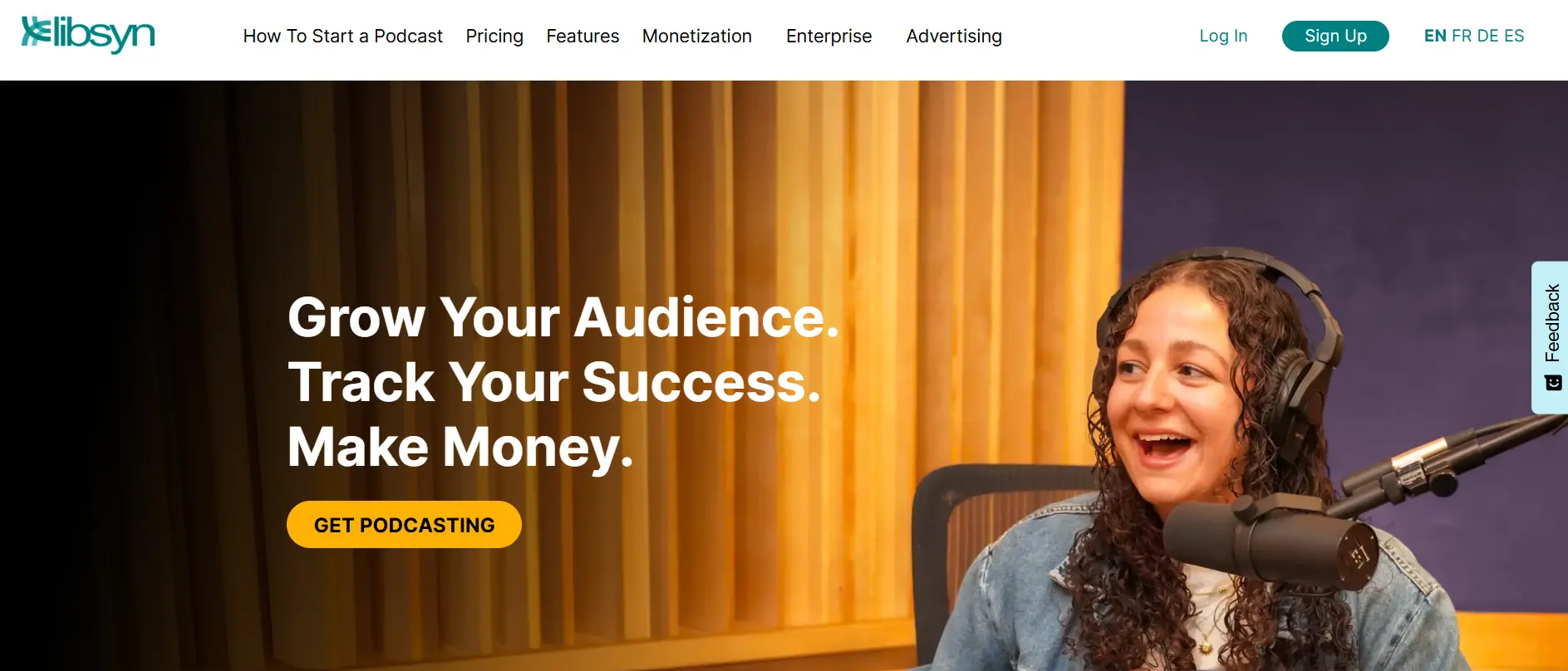
Overview
As one of the oldest podcast hosting platforms, Libsyn has refined its service over nearly two decades. It offers robust statistics, flexible publishing options, and extensive monetization tools preferred by experienced podcasters.
Key Features
- Advanced Statistics: Detailed download analytics and listener demographics
- Multiple Publishing Options: Various RSS feed configurations and scheduling tools
- Libsyn Ads: Built-in advertising marketplace for monetization
- Mobile Apps: iOS and Android apps for podcast management
- API Access: Developer tools for custom integrations
Pros:
- Proven reliability with excellent uptime
- Comprehensive analytics and reporting
- Flexible monetization options
- Strong reputation in the podcasting community
Cons:
- Interface feels dated compared to newer platforms
- Steeper learning curve for beginners
- Limited built-in editing tools
Pricing
Plans start at $15/month for 400MB of monthly uploads, with unlimited plans available for higher volume podcasters.
4. Podbean - Best for Monetization
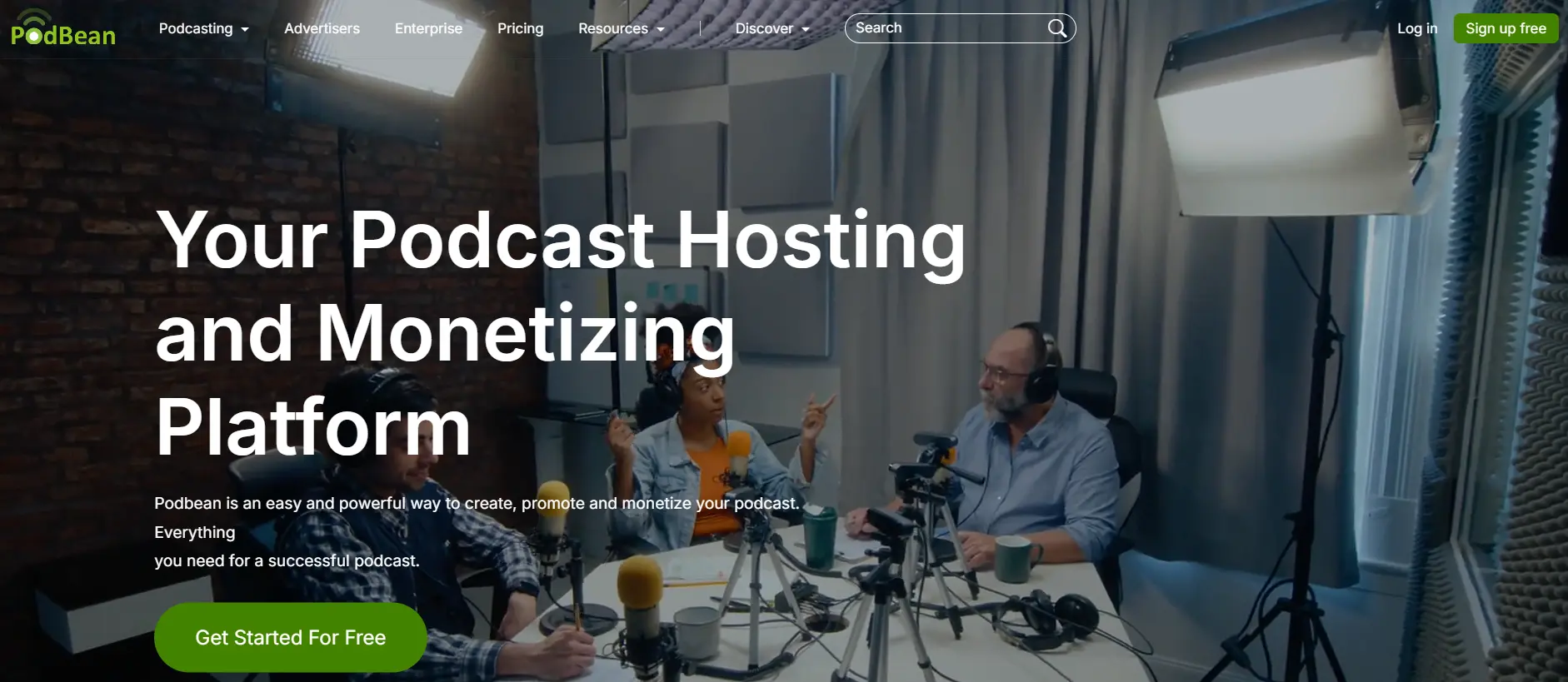
Overview
Podbean offers comprehensive monetization tools including advertising, premium subscriptions, and live streaming capabilities. It’s ideal for podcasters focused on generating revenue from their content.
Key Features
- Podbean Ads: Built-in advertising marketplace with automatic ad insertion
- Premium Subscriptions: Paywall content for subscriber-only episodes
- Live Streaming: Real-time podcast broadcasting with audience interaction
- Patron Program: Fan funding and tip collection from listeners
- Mobile Apps: Full-featured iOS and Android podcast apps
Pros:
- Comprehensive monetization options
- Live streaming capabilities included
- Good value for money on entry-level plans
- Strong mobile app experience
Cons:
- Interface can feel cluttered with many features
- Live streaming quality varies with internet connection
- Limited customization for podcast websites
Pricing
Plans start at $9/month for basic hosting, with higher tiers offering advanced monetization and unlimited storage.
5. Castos - Best for WordPress Users
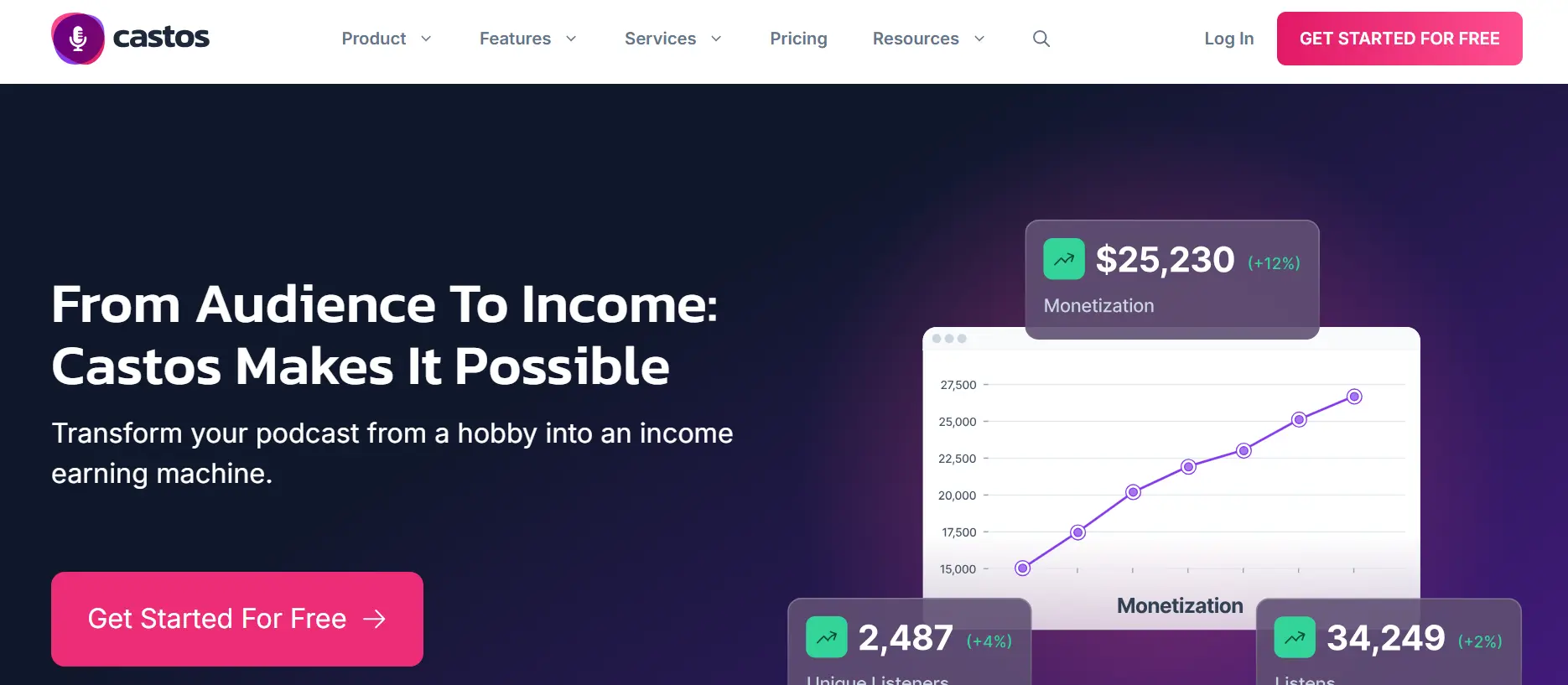
Overview
Castos specializes in WordPress integration, making it the perfect choice for bloggers and website owners who want to add podcasting to their existing content strategy. Their Seriously Simple Podcasting plugin is industry-leading.
Key Features
- WordPress Plugin: Deep integration with WordPress websites
- Private Podcasting: Password-protected content for premium subscribers
- Transcription Services: Automatic and human transcription options
- YouTube Republishing: Automatic video creation and YouTube upload
- Advanced Analytics: Detailed listener insights and website integration data
- Content Enhancement: Leverage professional transcription tools for better accessibility
Pros:
- Seamless WordPress integration
- Excellent transcription services
- Professional private podcasting features
- Good customer support and documentation
Cons:
- More expensive than pure hosting platforms
- Requires WordPress knowledge for full utilization
- Limited standalone features outside WordPress
Pricing
Plans start at $19/month for 20,000 downloads, with enterprise options available for high-volume podcasters.
6. RSS.com - Best for Advanced Features
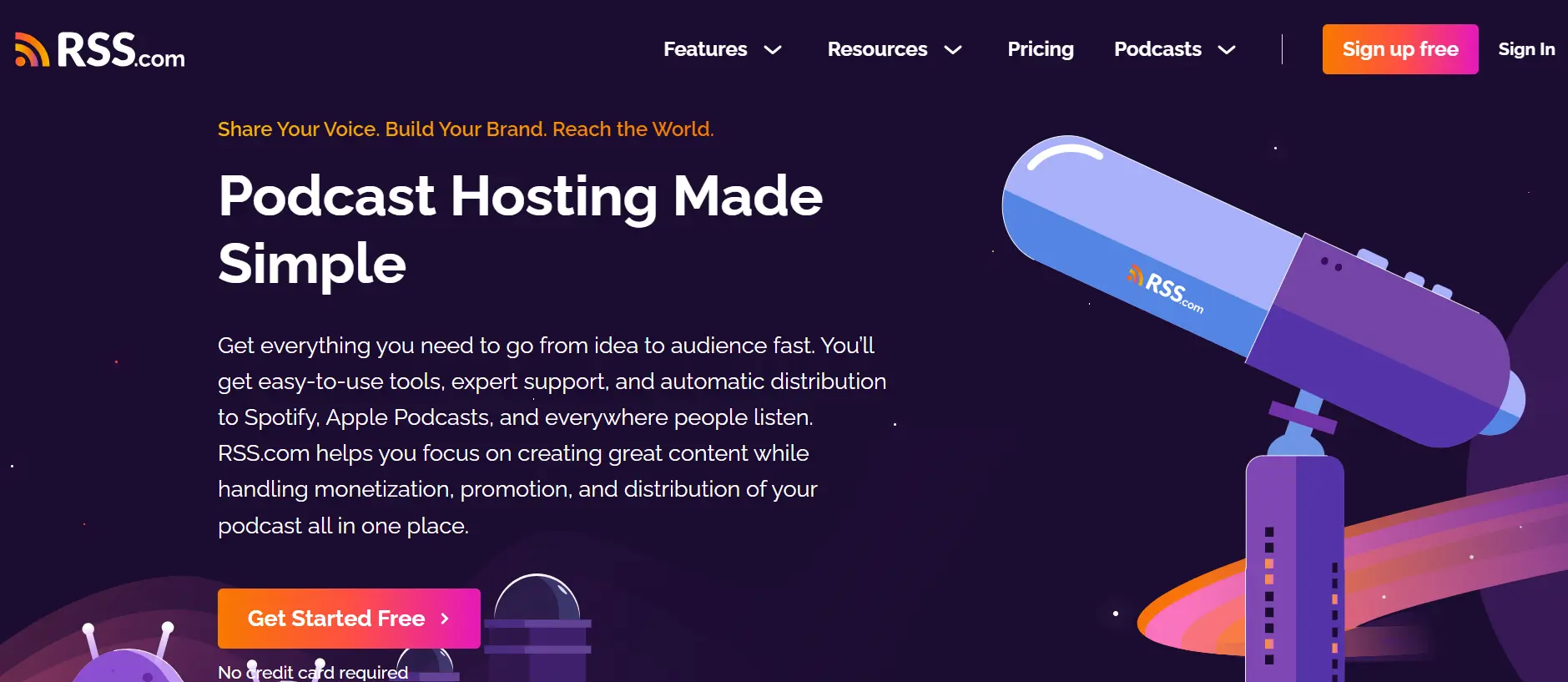
Overview
RSS.com leverages artificial intelligence to provide advanced features like automatic transcription, content suggestions, and dynamic ad insertion. It’s perfect for tech-savvy podcasters wanting cutting-edge tools.
Key Features
- AI Transcription: Automatic episode transcripts with high accuracy
- Dynamic Ad Insertion: Real-time ad placement and optimization
- Content AI: AI-powered show notes and episode summaries
- Advanced Analytics: Machine learning insights for audience optimization
- API Integration: Extensive developer tools and custom integrations
- Professional Tools: Integrates with advanced transcription services for enhanced accuracy
Pros:
- Cutting-edge AI features save time and effort
- Excellent transcription accuracy
- Advanced analytics with actionable insights
- Strong technical infrastructure
Cons:
- Higher learning curve for non-technical users
- Premium pricing for AI features
- Newer platform with fewer community resources
Pricing
Plans start at $18/month for AI-powered features, with scalable pricing based on usage and download volumes.
7. Spreaker - Best for Live Broadcasting
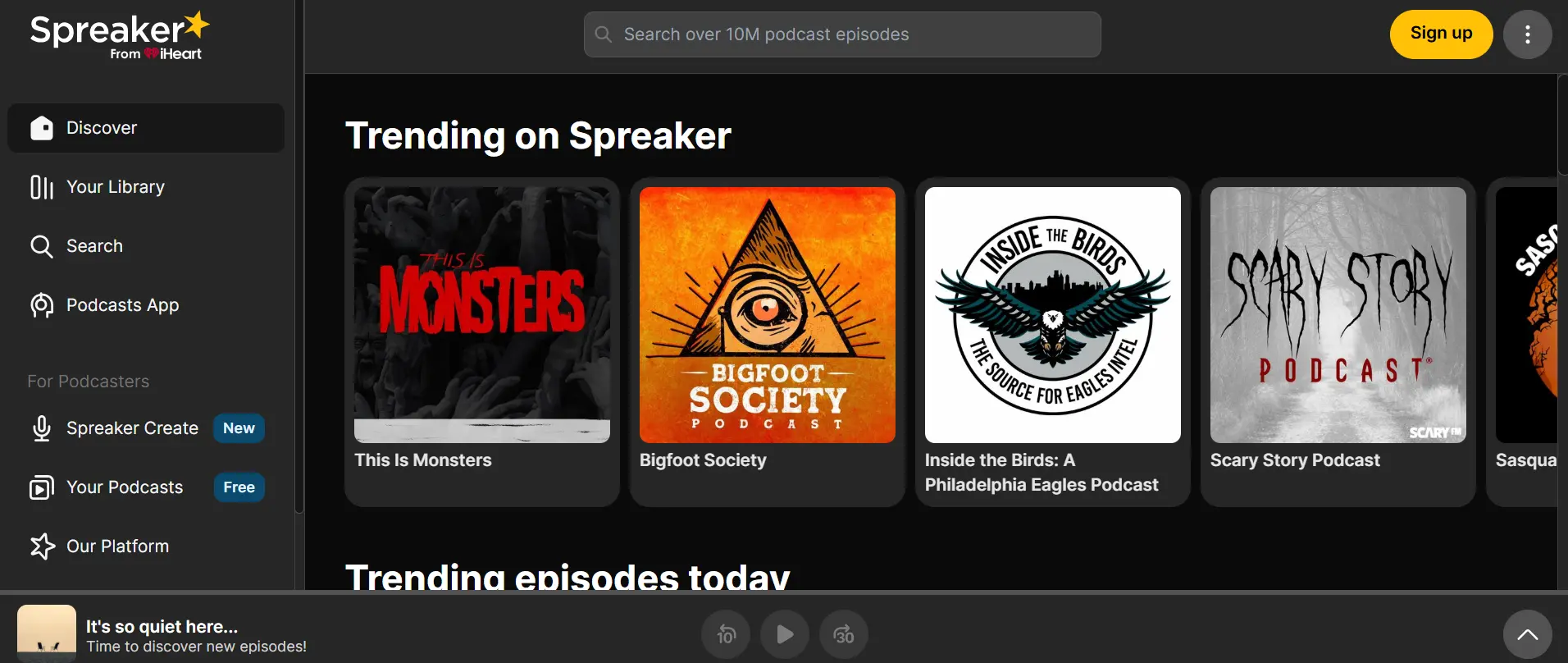
Overview
Spreaker pioneered live podcast broadcasting and continues to excel in real-time content creation. It’s ideal for podcasters who want to engage audiences with live shows, call-ins, and interactive content.
Key Features
- Live Streaming: Professional live podcast broadcasting tools
- Call-in Features: Allow listeners to join live shows via phone
- Real-time Chat: Interactive chat during live broadcasts
- Recording Tools: Built-in recording and editing capabilities
- Mobile Broadcasting: Full live streaming from mobile devices
Pros:
- Excellent live streaming capabilities
- Interactive features boost audience engagement
- Good mobile app for on-the-go broadcasting
- Affordable entry-level pricing
Cons:
- Live streaming requires stable internet connection
- Limited analytics compared to pure hosting platforms
- Interface can be complex for simple pre-recorded podcasts
Pricing
Plans start at $7/month for basic features, with professional live streaming tools available on higher tiers.
8. Simplecast - Best for Analytics Focus
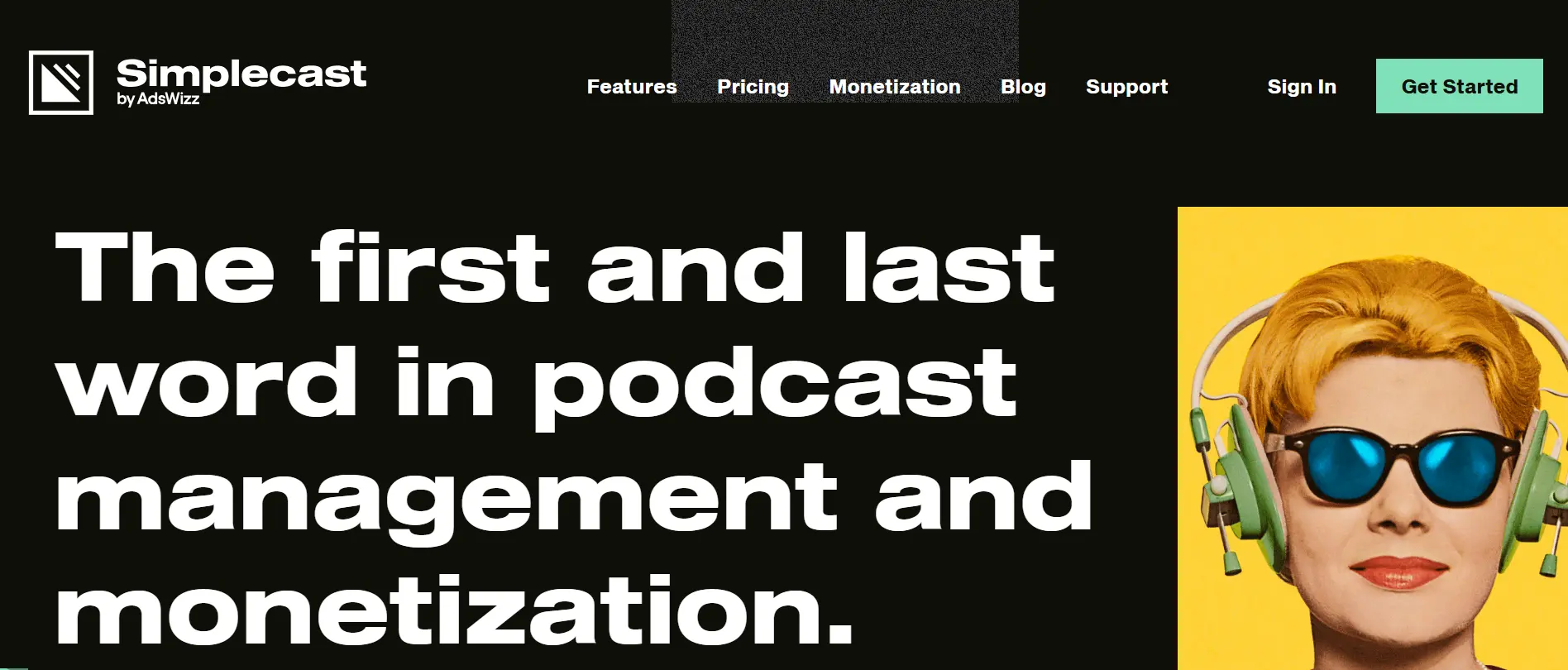
Overview
Simplecast provides industry-leading analytics and listener insights, making it perfect for data-driven podcasters who want to understand their audience deeply and optimize content accordingly.
Key Features
- Advanced Analytics: Comprehensive listener behavior analysis
- Audience Insights: Detailed demographic and geographic data
- Episode Performance: Track which content resonates most with listeners
- Download Verification: Industry-standard IAB compliance for accurate metrics
- Custom Reporting: Branded analytics reports for sponsors and stakeholders
Pros:
- Industry-leading analytics and reporting
- IAB-compliant download tracking
- Clean, professional interface
- Excellent customer support
Cons:
- Higher pricing for advanced analytics features
- Limited built-in editing tools
- Fewer monetization options than competitors
Pricing
Plans start at $15/month for basic analytics, with enterprise-level reporting available on higher tiers.
9. Acast - Best for Advertising
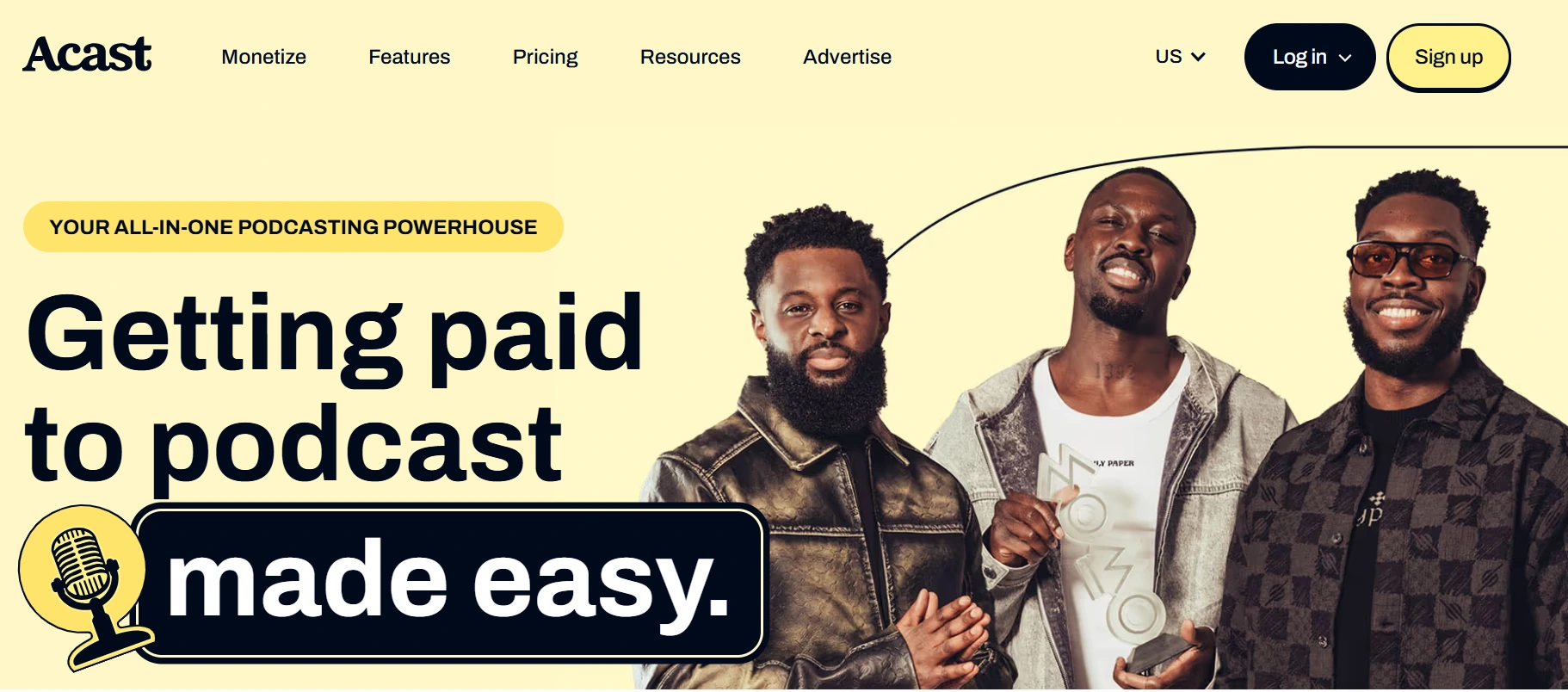
Overview
Acast operates a global advertising marketplace that connects podcasters with premium brands. It’s ideal for established podcasters looking to maximize advertising revenue through programmatic ad sales.
Key Features
- Programmatic Advertising: Automatic ad sales and placement optimization
- Global Ad Marketplace: Access to international brand advertisers
- Dynamic Ad Insertion: Real-time ad updates and targeting
- Advanced Targeting: Demographic and behavioral audience targeting
- Revenue Optimization: AI-powered ad placement for maximum earnings
Pros:
- Access to premium advertising marketplace
- Automatic ad sales and optimization
- Global reach and brand connections
- Professional revenue management tools
Cons:
- Requires significant audience size for ad approval
- Custom pricing can be expensive for smaller podcasters
- Limited features outside advertising focus
Pricing
Contact Acast for custom pricing based on audience size and advertising requirements.
10. Megaphone - Best for Enterprise Podcasting
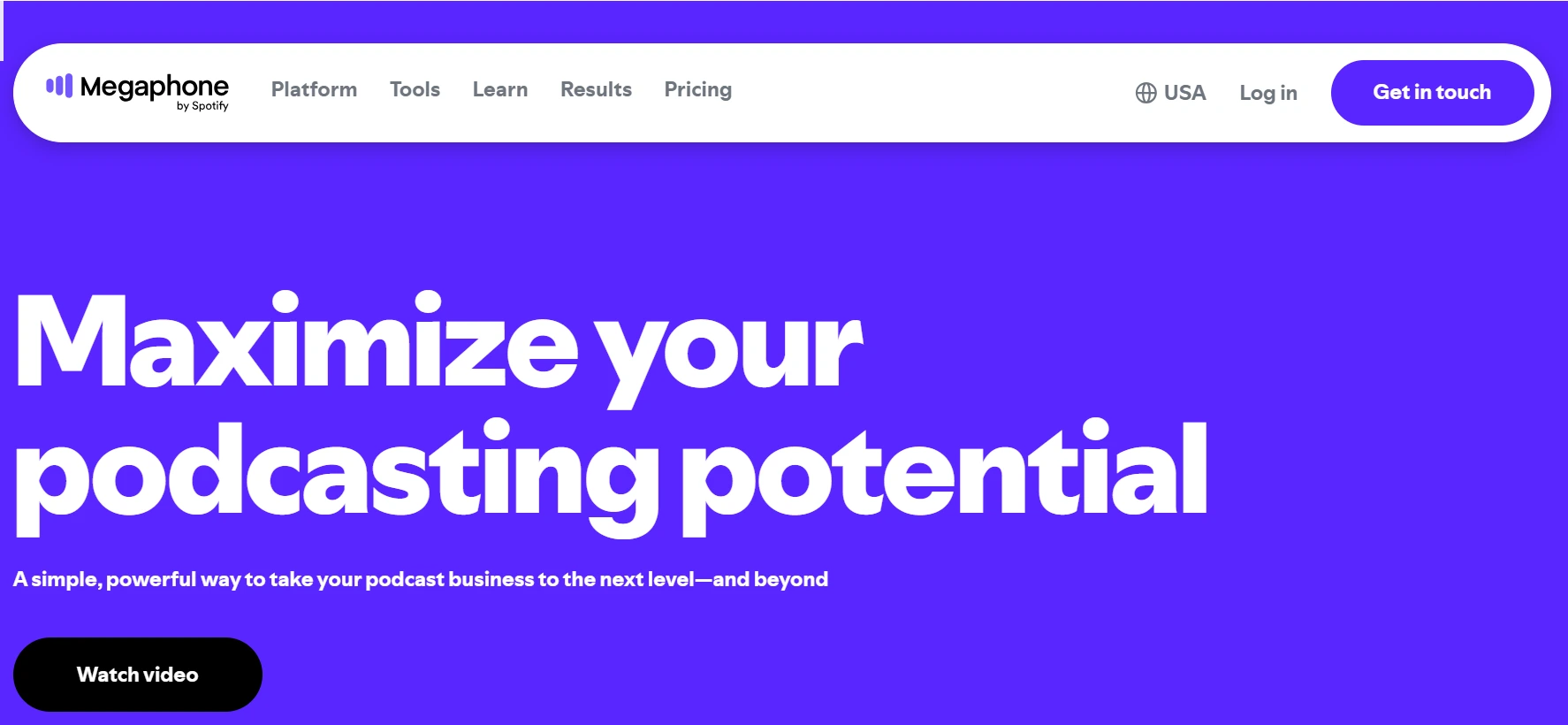
Overview
Megaphone, owned by Spotify, is a premium podcast hosting platform designed for enterprise-level podcasters, media companies, and established creators. It offers advanced monetization tools, sophisticated analytics, and professional-grade features for serious podcasting operations.
Key Features
- Enterprise Analytics: Advanced listener insights and demographic data
- Dynamic Ad Insertion: Real-time ad placement and optimization
- Programmatic Advertising: Access to Spotify’s advertising marketplace
- Multi-Show Management: Handle multiple podcasts under one account
- Advanced Targeting: Demographic and behavioral audience targeting
- Professional Support: Dedicated account management and support
Pros:
- Enterprise-grade reliability and performance
- Access to Spotify’s advertising ecosystem
- Advanced monetization capabilities
- Professional customer support
- Sophisticated analytics and reporting
- Scalable for large operations
Cons:
- High pricing makes it inaccessible for small creators
- Requires significant audience size for approval
- Complex setup and management
- Limited customization options
- Steep learning curve
Pricing
Contact Megaphone for enterprise pricing based on audience size and requirements.
11. RedCircle - Best for Revenue Sharing
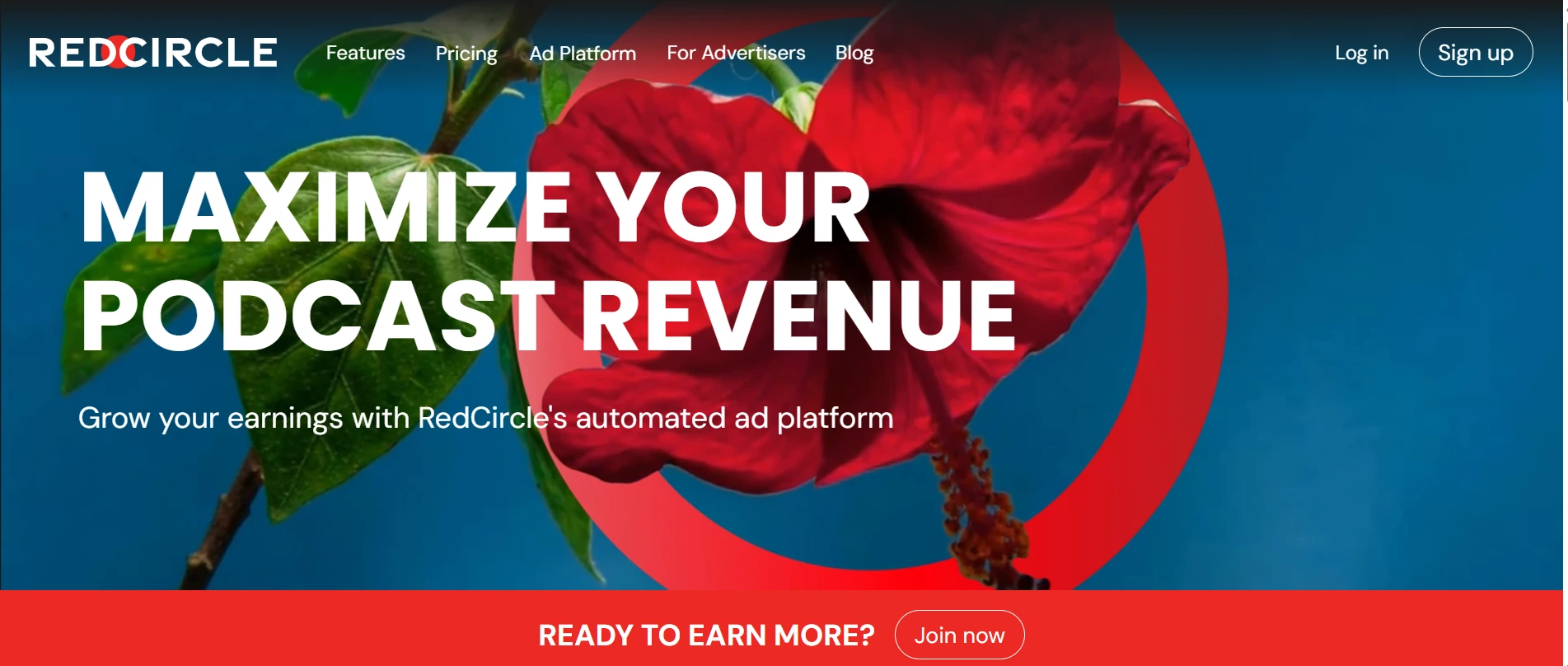
Overview
RedCircle offers a unique model with free hosting funded by ad revenue sharing. Podcasters keep a percentage of advertising income without paying hosting fees, making it attractive for monetization-focused creators.
Key Features
- Free Hosting: No monthly fees, funded by advertising revenue
- Ad Revenue Sharing: Keep percentage of advertising income
- Automatic Monetization: Built-in ad insertion and optimization
- Listener Support: Fan funding and tip collection features
- Basic Analytics: Essential download and listener metrics
Pros:
- Completely free hosting with earning potential
- No upfront costs or monthly fees
- Built-in monetization from day one
- Simple setup and management
Cons:
- Limited control over advertising content
- Basic analytics compared to paid platforms
- Revenue dependent on audience size and engagement
- Fewer customization and advanced features
Pricing
Free hosting with revenue sharing model - podcasters keep a percentage of generated advertising income.
Comparison of Key Features
Storage and Bandwidth
Most modern podcast hosting platforms offer unlimited bandwidth, but storage varies significantly. Spotify for Podcasters (formerly Anchor) and RedCircle provide unlimited storage for free, while paid platforms typically offer 3-20 hours of monthly uploads on entry-level plans.
Analytics and Reporting
Advanced analytics are crucial for growing your podcast. Simplecast and Buzzsprout lead in comprehensive listener insights, while free platforms like Spotify for Podcasters (formerly Anchor) provide basic download statistics. IAB-compliant tracking ensures accurate metrics for potential sponsors.
Monetization Options
Monetization capabilities range from basic affiliate programs to sophisticated programmatic advertising. Acast and Podbean excel in advertising solutions, while platforms like Castos and Transistor focus on premium subscription models.
Technical Features
Modern features like automatic transcription (RSS.com), dynamic ad insertion (Acast), and live streaming (Spreaker) can significantly enhance your podcast’s professional appeal and audience engagement. Many platforms also integrate with advanced video editing tools for creating promotional content and screen recording capabilities for video podcast production.
Website Integration
Many podcasters benefit from WordPress integration or built-in website builders. Consider how your podcast will integrate with existing online presence. Platforms like Castos offer seamless WordPress integration, while others provide built-in website builders. You can also enhance your podcast website with professional video editing tools for creating promotional content and screen recording capabilities for video podcast production.
Choosing the Right Platform for Your Needs
For Beginners
Start with Spotify for Podcasters or Buzzsprout. Spotify for Podcasters (formerly Anchor) offers completely free hosting to test the waters, while Buzzsprout provides excellent support and automatic optimization for those ready to invest in quality.
For Established Podcasters
Consider Libsyn, Simplecast, or Transistor for advanced features, detailed analytics, and professional monetization tools that support growing audiences.
For Businesses
Transistor and Castos offer excellent team collaboration, private podcasting, and professional features essential for corporate podcasting initiatives.
For Revenue Focus
Acast, Podbean, or RedCircle provide comprehensive monetization tools, from automated advertising to premium subscription management.
Future Trends in Podcast Hosting
AI-Powered Features
Platforms increasingly integrate artificial intelligence for automatic transcription, content optimization, and listener behavior analysis. RSS.com leads this trend with comprehensive AI tools. Many platforms now offer AI-powered transcription services that can automatically convert your podcast episodes into searchable text, improving accessibility and SEO performance.
Video Podcasting Growth
Video podcast support is expanding rapidly, with Spotify and other platforms prioritizing visual content. Choose hosts that support both audio and video formats for future flexibility. Consider using professional video editing tools and screen recording capabilities to create high-quality video podcast content that stands out in the competitive landscape.
Interactive Content
Live streaming, audience polls, and real-time engagement features are becoming standard. Platforms like Spreaker and Spotify for Podcasters lead in interactive capabilities.
Advanced Analytics
Deeper listener insights, predictive analytics, and cross-platform tracking help podcasters understand and grow their audiences more effectively.
Security and Privacy Considerations
Data Protection
Choose platforms with robust data protection policies, especially for audience analytics and listener information. GDPR compliance is essential for international audiences.
Content Backup
Ensure your chosen platform provides reliable content backup and export options. Avoid vendor lock-in by maintaining control over your RSS feed and episode files.
Privacy Controls
Private podcasting features allow secure content distribution for corporate training, premium subscribers, or sensitive information sharing.
Cost Analysis and Value Comparison
Free vs. Paid Platforms
Free platforms like Spotify for Podcasters (formerly Anchor) and RedCircle work well for beginners, but paid services offer better analytics, customization, and professional features essential for serious podcasters.
Scalability Considerations
Choose platforms that can grow with your podcast. Per-download pricing models become expensive with large audiences, while unlimited plans provide better long-term value.
Hidden Costs
Consider additional costs for transcription services, premium analytics, advanced monetization tools, and professional support when comparing platforms. Professional transcription services can significantly improve your podcast’s accessibility and SEO, while advanced video editing tools can help create promotional content that drives more listeners to your show.
Getting Started with Podcast Hosting
Essential Setup Steps
- Choose Your Platform: Select based on your budget, technical needs, and growth plans
- Create Your Account: Complete platform registration and payment setup
- Configure Your Podcast: Add show information, artwork, and category selections
- Upload Your First Episode: Test the upload process and RSS feed generation
- Submit to Directories: Distribute to Apple Podcasts, Spotify, Google Podcasts, and others
- Set Up Analytics: Configure tracking and begin monitoring audience growth
Best Practices
- Maintain consistent episode naming and metadata formatting
- Use high-quality artwork that meets platform requirements
- Write compelling show descriptions with relevant keywords
- Set up automatic social media promotion for new episodes
- Monitor analytics regularly to understand audience preferences
- Create engaging social media content to promote your podcast episodes
- Leverage content repurposing strategies to maximize your podcast’s reach
Technical Requirements and Considerations
Audio Quality Standards
Most platforms accept MP3 files with 44.1kHz sample rate and 128-320 kbps bitrate. Higher quality files provide better listener experience but require more storage.
RSS Feed Management
Your RSS feed is your podcast’s most important technical asset. Choose platforms that provide full RSS control and easy export options to avoid vendor lock-in.
Website Integration
Many podcasters benefit from WordPress integration or built-in website builders. Consider how your podcast will integrate with existing online presence. Platforms like Castos bridge both needs with excellent WordPress integration.
Mobile App Support
Platforms with dedicated mobile apps allow easier episode management and real-time analytics monitoring for busy podcasters.
Conclusion
Choosing the right podcast hosting platform significantly impacts your show’s success in 2025. Buzzsprout offers the best overall experience for most podcasters, combining ease of use with professional features. Spotify for Podcasters (formerly Anchor) remains unbeatable for free hosting, while Transistor excels for business and team podcasting.
For established podcasters focused on monetization, Acast and Podbean provide comprehensive advertising solutions. Technical users will appreciate RSS.com’s AI-powered features, while WordPress users should strongly consider Castos for seamless integration. Enterprise-level podcasters will find Megaphone offers the most sophisticated tools and analytics.
The podcast hosting landscape continues evolving with AI integration, video support, and advanced analytics. Choose a platform that not only meets your current needs but can scale with your podcast’s growth and adapt to future podcasting trends.
Remember that your hosting platform is a long-term partnership. Prioritize reliability, customer support, and feature development over just price considerations. The right platform will help you focus on creating great content while handling the technical complexities of podcast distribution and audience growth.
Frequently Asked Questions
What is the difference between podcast hosting and website hosting?
Podcast hosting is specifically designed for audio content distribution with RSS feed generation, automatic submission to podcast directories, and specialized analytics. Website hosting stores general web content but lacks podcast-specific features like iTunes integration and audio optimization.
How much podcast hosting storage do I need?
Most podcasters need 3-5 hours of monthly uploads. A typical hour-long episode at standard quality requires about 50-100MB storage. Calculate based on your publishing frequency and episode length to choose appropriate hosting plans.
Can I switch podcast hosting platforms later?
Yes, you can migrate between platforms, but the process requires careful RSS feed management to avoid losing subscribers. Choose platforms that provide easy export tools and maintain control over your RSS feed for smoother transitions.
Do I need separate hosting for my podcast website?
Many podcast hosts include basic website builders, but serious content creators often prefer separate WordPress hosting for better customization and SEO control. Platforms like Castos bridge both needs with excellent WordPress integration.
How important are podcast hosting analytics?
Analytics are crucial for understanding your audience, attracting sponsors, and optimizing content. Basic download numbers help track growth, while advanced demographics and engagement metrics inform content strategy and monetization opportunities.
What’s the difference between free and paid podcast hosting?
Free hosting typically includes basic features, limited analytics, and potential advertising or branding restrictions. Paid hosting offers advanced analytics, better customer support, monetization tools, and professional features essential for serious podcasters.
How do podcast hosts distribute episodes to different platforms?
Podcast hosts generate RSS feeds that contain episode information and audio links. Platforms like Apple Podcasts, Spotify, and Google Podcasts read these feeds to automatically update with new episodes across all directories simultaneously.
Can I monetize my podcast with any hosting platform?
Most platforms support basic monetization like affiliate marketing and sponsorships. However, advanced monetization features like dynamic ad insertion, premium subscriptions, and automated advertising vary significantly between hosts.
What happens if my podcast hosting company shuts down?
Choose established platforms with strong financial backing and always maintain backup copies of your episodes. Platforms with RSS export features allow easier migration if necessary. Avoid vendor lock-in by maintaining control over your content.
How do I choose between unlimited and per-download pricing?
Unlimited plans provide predictable costs and better value for growing podcasts. Per-download pricing can be economical for small audiences but becomes expensive with success. Consider your growth projections when choosing pricing models.
Do I need technical knowledge to use podcast hosting platforms?
Modern platforms like Buzzsprout and Anchor require minimal technical knowledge with user-friendly interfaces and automatic optimization. More advanced platforms may require basic understanding of RSS feeds and audio formats.
Can I host multiple podcasts on one account?
Platform policies vary significantly. Transistor includes unlimited podcasts on all plans, while others charge per show or limit the number of podcasts. Consider multi-show hosting if you plan to create multiple podcasts.
How often should I backup my podcast content?
Backup episodes monthly or after each upload, depending on your publishing frequency. Store copies locally and consider cloud backup services for additional security. Many professional podcasters maintain multiple backup locations.
What audio formats do podcast hosting platforms accept?
MP3 is the standard format supported by all platforms and podcast apps. Some hosts also accept WAV, M4A, or other formats but convert them to MP3 for distribution. Stick with MP3 for maximum compatibility.
How long does it take for new episodes to appear on podcast apps?
RSS feed updates are typically instantaneous, but podcast apps refresh feeds at different intervals. Apple Podcasts usually updates within 2-8 hours, while other platforms may take 24 hours. Some hosting platforms offer faster distribution to major directories.


